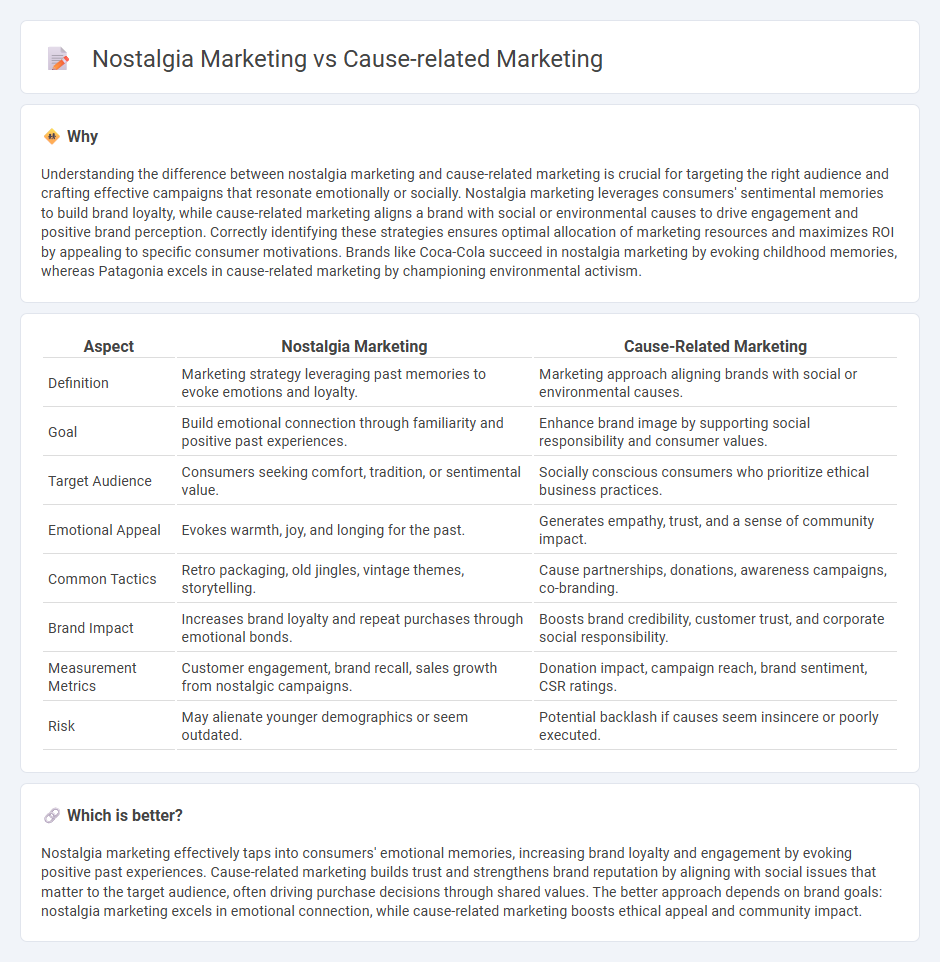
Nostalgia marketing leverages sentimental memories to create emotional connections with consumers, often invoking past experiences to boost brand loyalty. Cause-related marketing aligns brands with social or environmental causes, enhancing corporate responsibility and appealing to socially conscious customers. Explore these strategies to discover how they drive engagement and influence purchasing decisions.
Why it is important
Understanding the difference between nostalgia marketing and cause-related marketing is crucial for targeting the right audience and crafting effective campaigns that resonate emotionally or socially. Nostalgia marketing leverages consumers' sentimental memories to build brand loyalty, while cause-related marketing aligns a brand with social or environmental causes to drive engagement and positive brand perception. Correctly identifying these strategies ensures optimal allocation of marketing resources and maximizes ROI by appealing to specific consumer motivations. Brands like Coca-Cola succeed in nostalgia marketing by evoking childhood memories, whereas Patagonia excels in cause-related marketing by championing environmental activism.
Comparison Table
| Aspect | Nostalgia Marketing | Cause-Related Marketing |
|---|---|---|
| Definition | Marketing strategy leveraging past memories to evoke emotions and loyalty. | Marketing approach aligning brands with social or environmental causes. |
| Goal | Build emotional connection through familiarity and positive past experiences. | Enhance brand image by supporting social responsibility and consumer values. |
| Target Audience | Consumers seeking comfort, tradition, or sentimental value. | Socially conscious consumers who prioritize ethical business practices. |
| Emotional Appeal | Evokes warmth, joy, and longing for the past. | Generates empathy, trust, and a sense of community impact. |
| Common Tactics | Retro packaging, old jingles, vintage themes, storytelling. | Cause partnerships, donations, awareness campaigns, co-branding. |
| Brand Impact | Increases brand loyalty and repeat purchases through emotional bonds. | Boosts brand credibility, customer trust, and corporate social responsibility. |
| Measurement Metrics | Customer engagement, brand recall, sales growth from nostalgic campaigns. | Donation impact, campaign reach, brand sentiment, CSR ratings. |
| Risk | May alienate younger demographics or seem outdated. | Potential backlash if causes seem insincere or poorly executed. |
Which is better?
Nostalgia marketing effectively taps into consumers' emotional memories, increasing brand loyalty and engagement by evoking positive past experiences. Cause-related marketing builds trust and strengthens brand reputation by aligning with social issues that matter to the target audience, often driving purchase decisions through shared values. The better approach depends on brand goals: nostalgia marketing excels in emotional connection, while cause-related marketing boosts ethical appeal and community impact.
Connection
Nostalgia marketing and cause-related marketing are connected through their ability to emotionally engage consumers by tapping into personal values and memories. Nostalgia marketing evokes positive associations from the past, while cause-related marketing aligns brands with social or environmental causes that resonate deeply with target audiences. Both strategies enhance brand loyalty by fostering meaningful connections that go beyond traditional advertising.
Key Terms
**Cause-related marketing:**
Cause-related marketing leverages partnerships between businesses and nonprofit organizations to promote social or environmental causes, enhancing brand reputation and consumer loyalty. This strategy drives sales by aligning product promotions with charitable contributions or awareness campaigns, appealing to socially conscious consumers. Explore how cause-related marketing can strengthen your brand and foster meaningful customer connections.
Social Cause
Cause-related marketing leverages partnerships with social causes to enhance brand reputation, foster consumer trust, and drive engagement through purposeful campaigns. Nostalgia marketing taps into consumers' emotional connections with past experiences but often lacks the direct social impact and activism that cause-related marketing offers. Explore how aligning with social causes can amplify your brand's authenticity and create meaningful consumer relationships.
Brand Alliance
Cause-related marketing leverages partnerships between brands and social causes to enhance brand reputation and consumer loyalty by aligning with socially responsible initiatives, while nostalgia marketing taps into consumers' emotional memories to create a sentimental brand connection that drives engagement. Brand alliances in cause-related marketing often involve co-branded campaigns that highlight shared values and social impact, whereas nostalgia marketing alliances may focus on reviving classic brand elements or collaborations that evoke past cultural moments. Explore more about how strategic brand alliances amplify the effectiveness of both cause-related and nostalgia marketing approaches to deepen consumer relationships.
Source and External Links
What is Cause Marketing? | University of Phoenix - Cause-related marketing is a strategic collaboration between businesses and nonprofit organizations aimed at benefiting both by increasing brand awareness, building trust, and supporting social causes, which enhances customer loyalty and differentiates brands from competitors.
What is Cause Marketing? | Mailchimp - Cause marketing involves a collaboration between a for-profit business and a nonprofit organization where both parties mutually benefit by improving social responsibility perception and raising awareness for the nonprofit's mission.
The 4 Types of Cause Marketing (With Examples) - Givz - Cause marketing is when brands transparently share their support for social causes to build deeper customer relationships, inspire loyalty, and differentiate themselves by aligning with causes meaningful to their audience.
 dowidth.com
dowidth.com